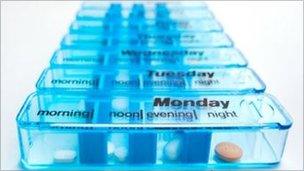Study calls for all over 55 to be offered heart drugs
- Published

The study says preventive treatments like cholesterol and blood pressure lowering drugs could be given to all people over 55
All those over 55 should be offered drugs to lower cholesterol and blood pressure, according to a new study.
The report says that when assessing the risk of heart problems, offering treatment to all over-55s had the same results as testing for cholesterol or blood pressure problems.
The authors also argue it would be more simpler and cost effective.
But the Department of Health says the focus of the study is too narrow and ignores other health problems.
Writing in the open access journal PLoS ONE the authors, from the Wolfson Institute at Barts and the London Medical School, said age was by far the biggest factor in assessing someone's risk of cardiovascular disease such as heart attack or stroke.
They compared the effects of two screening programmes on a theoretical population of 500,000 people.
The first approach used screening just by age, where, at the age of 55, people would be offered preventive treatment, regardless of whether they were at risk.
The second approach used existing screening methods, based on age and sex, and whether someone was a smoker or has high blood pressure or cholesterol.
They found that both approaches had an 84% detection rate, but that offering everyone preventive treatment at 55 would be more cost effective.
The two methods also had a broadly similar false-positive rate - in other words, using age alone would diagnose 24% of people as being at risk, when in fact they would not go on to develop heart problems.
Existing methods of screening identified 21% of false-positives.
If screening by age alone was introduced, the authors believe it could prevent as many as 100,000 heart attacks and strokes each year in England and Wales alone.
Professor Sir Nicholas Wald is the lead author of the report and Director of the Wolfson Institute.
He said: "This study shows that age screening for future cardiovascular disease is simpler than current assessments, with a similar screening performance and cost effectiveness. It also avoids the need for blood tests and medical examinations.
"With age screening, all individuals above a specified age would be offered preventive treatment. Everyone would benefit because, for blood pressure and cholesterol, the lower the better.
"The policy of selecting people above a certain age is, in effect, selecting people at high risk. It recognises that age is by far the most important determinant of that risk with other factors adding little extra prognostic information.
"Prevention is better than measurement. Identifying people at high risk of cardiovascular disease needs to be greatly simplified, enabling people to obtain easy access to preventive treatment from nurses and pharmacists as well as from doctors."
Professor Nicholas Wald, director of the Wolfson Institute, and GP Dr Rosemary Leonard, debate using age as an indicator to start taking statins and blood pressure pills
Other factors
But the British Heart Foundation said other risk factors in addition to age needed to be taken into account when it came to assessing the future risk of heart and circulatory problems.
Natasha Stewart, senior cardiac nurse at the British Heart Foundation, said the research showed similar results to other more detailed risk assessments in an older population.
"But vitally it would miss younger people in higher risk groups such as those with a family history of heart disease, people of South Asian origin and people with diabetes.
"Because this model is cheaper it may be useful for a widespread screening programme. But it's essential that we continue full risk assessments for younger people who may be at significant risk of getting heart and circulatory disease.
"Recognising and treating other risk factors such as high cholesterol and high blood pressure in people aged 40 to 55 could prevent them from developing heart and circulatory disease in the first place, which is the best outcome for them and makes economic sense for the NHS too."
A statement from the Department of Health also sounded a note of caution.
"This study looked at the risk of cardio-vascular disease alone - a narrower focus than the NHS Health Check programme, which also identifies those at risk of diabetes and chronic kidney disease.
"That's why we start risk assessment at age 40. Blood pressure, cholesterol, height, weight and whether people smoke are all considered. This group of simple measurements, along with age, sex and ethnicity, are used to assess risk.
"The NHS Health Check programme is based on evidence of how to measure and tackle risk - and underpinned by modelling that demonstrates it is clinically and cost effective.
"However, we agree that we must focus on prevention. That is why we are putting in place a public health service to give local people the money and the power to improve our nation's health.
"And as part of Change4life we are encouraging people to make simple changes, such as eating more fruit and vegetables and being more active."
- Published2 May 2011
- Published6 September 2010